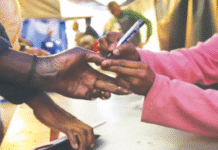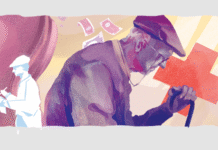Economic growth prospect under severe strain
Mahfuz Anam
AS we write we are deeply worried how the events of today, Friday, will play out. So are our readers and the people of the country.
We, the voters, do not deserve this. We have been good citizens, we have worked hard, we have accepted a lot of hardships, lived with lots of inadequacies and have, in spite of many shortcomings, tried our best to contribute to the growth of the country. Why then should we face the Hobson’s Choice of being damned if do or damned if we don’t. Like in Ancient Rome a ‘Gladiatorial fight’ seems to have been set for today and as spectators we wait to see which team will win — will BNP be able to hold its rally or will government’s goons with the help from the police be able to thwart it? Can this be our fate?
The tragic difference with the Roman gladiatorial scene is that for Bangladesh in the 21st Century it is not a game. It has to do with our future, and we accuse both leaders and their respective parties of caring a damn about it. This politics is at the cost of Bangladesh.
The global climate change is expected to cause havoc in the future, and Bangladesh has been identified as the most vulnerable country in the world. Our rivers are polluted, in the coastal belt salinity is on the rise, in some parts arsenic has entered our food chain, agricultural productivity through use of chemical fertiliser has mostly peaked, population remains a big challenge and urbanisation is a deadly mess, and yet there has been no discussion, no debate either inside or outside the parliament on these vital issues. All we can do, and have been doing, is bad mouthing one another as if there was no tomorrow.
The World Bank has, last Wednesday, brought down our growth prospect from 6.2% to 5.7% with the warning that it may slide further if we are unable to solve our political crisis.
International Credit Agency Moody’s Investor’s Service has warned that political turmoil before the elections may affect our sovereign rating. Anybody with the slightest idea of how an economy works should be alarmed at the possibility of lowering of sovereign rating and its possible impact on FDI and trade. But do either of our political parties care? So busy are they in street fighting that we doubt if they had time to read these reports.
Why should we as a people be deprived of a growth rate of 6-plus percent just because AL and BNP want to fight? Why should we forego the possibilities of higher FDI and trade with the prospect of large scale employment growth and greater earning because our two leading political parties cannot agree on a formula for elections? Why should we suffer hartals or any sort of disruptions in our work just because AL and BNP are obsessed with power? Why should our citizens die because our two leaders let them loose, like vicious animals, upon each other to kill or be killed? We find the regular sight of police mercilessly beating ordinary citizens as supremely insulting for a country that claims to be democratically run?
Yes, the present AL government has impressive infrastructural, agricultural and some development indicators to its credit, for which it deserves praise and we do so unhesitatingly. But in the same breath it deserves our condemnation for putting it all in jeopardy through a reckless and self-serving politics that is devoid of logic and more importantly truth.
Why our political leaders cannot see the ruinous economic future that they are leading us to with the present level of confrontational politics is something that boggles the mind of all Bangladesh’s international friends. Because of rising confrontational politics, some urgently needed reform actions have gone out of our national focus.
Take the case of our garments. What steps did we take after losing the US GSP facilities? We recall how our foreign minister, almost mockingly, referred to its impact saying less than one per cent of our export was under US GSP, implying that we really do not need to lose sleep over its cancellation.
The same attitude was evident in the follow up to the Rana Plaza tragedy. Nothing substantive has been done to meet the concern of our workers and those of the international buyers with the result that on Wednesday the World Bank warned that we should act before EU cancels GSP, which may have disastrous impact on our economy. The country director of WB, Johannes Zutt said, in reference to the lack of urgent actions to ensure labour safety and health of workers, that our “dynamic” RMG sector was at a “crossroad,” that Bangladesh’s image has been “severely” tarnished, and that EU will follow the US route unless we act fast.
For the economy to grow we need a peaceful, supportive and congenial environment. Instead, what we are being given is intolerance, falsehood, confrontation and violence. Without investment, both national and foreign, there will not be any rise of employment, and without increased employment our youth will not get any jobs, which will push them towards lawlessness and extremism. But there will not be any investment in a situation of political violence. Knowing all this, how can we indulge in such a self-destructive politics?
Most importantly this politics punishes the common people in whose name these two political parties and their leaders act. Hartals make the day labourers go hungry. Those who earn on a daily basis, and there are millions of them, are left without any earning. The small traders suffer hugely in times of political violence. Ordinary citizens, peacefully going about their daily work face fear and uncertainty because of confrontation politics. What future are we building for our younger generation when so many of them are being used to burn cars, buses and other properties in the name of “andolon” (movement).
This politics is definitely at the cost of Bangladesh and history will hold our two leaders and their parties responsible for turning a prospective Bangladesh into a disastrous Bangladesh.
The writer is Editor and Publisher, The Daily Star.
Source: The Daily Star









